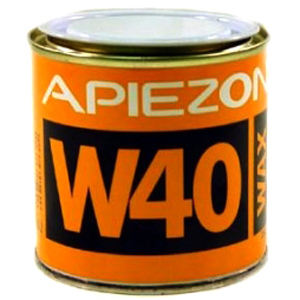High vacuum joints of a more permanent nature, not required to be movable, are best sealed with one of the Apiezon® waxes rather than by a grease. Three grades of wax are available, all basically similar, but differing in their hardness and softening points, from hard Wax W softening at 80′ to 90’C to relatively soft Wax W40 softening at about 40’C. Wax W would be chosen for sealing most joints; a softer grade is used where the lower softening point makes application easier or where the softer wax is desirable because of probable vibration of the joint.
Apiezon® waxes have powerful gettering’ properties similar to the greases. This coupled with their purity and very’clean’meltdown characteristics has led to their extensive use in the electronics industry. Apiezon waxes are used in the manufacture of silicon transistors and integrated circuits, both as miniature mounting blocks (in the form of small chips) and by deposition from a solution in a suitable solvent, as the masking medium in etching processes. Their extreme chemical inertness makes them very resistant to etching fluids such as hydrofluoric acid, nitric acid, acetic acid, but they are easily and rapidly removed by hydrocarbon or chlorinated solvents.
Specifications Table:
| Apiezon® Waxes Technical Data | Wax W40 | Wax W100 | Wax W | Compound Q |
| Approximate softening point, degrees C | 45 | 55 | 85 | 45 |
| Temperature for application, degrees C | 90 | 110 | 130 | Ambient |
| Maximum temperature for use, degrees C | 40 | 50 | 80 | 30 |
| Specific gravity at 20 deg.C/15.5 deg.C | 1.017 | 1.567 | 1.055 | |
| Specific gravity at 30 deg.C/15.5 deg.C | 1.010 | 1.561 | 1.048 | |
| Average molecular weight | 1140 | 1160 | 1214 | |
| Coefficient of expansion per deg.C over 20 deg.C-20 degC | 0.00063 | – | 0.00062 | |
| Thermal conductivity Btu. in/ft2h degrees F | 1.23 | 1.18 | 1.31 | |
| w/m degrees C | 0.177 | 0.170 | 0.189 | |
| Specific heat at 25 degrees C, cal/g | 0.51 | 0.70 | 0.43 | |
| Joule/g | 2.1 | 2.9 | 1.8 | |
| Loss tanget | 0.015 | 0.016 | 0.015 | |
| Permittivity | 2.9 | 2.7 | 2.8 | |
| Volume resistivity, ohm/cms | 5.055×1015 | 1.64×1015 | 6.31×101 |



